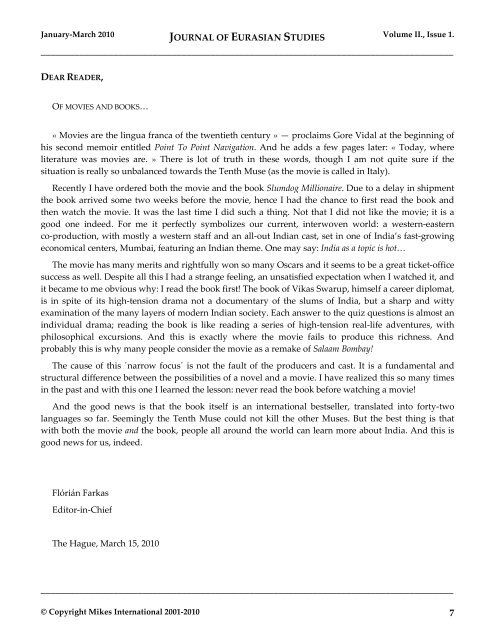EurasianStudies_0110..
EurasianStudies_0110..
EurasianStudies_0110..
You also want an ePaper? Increase the reach of your titles
YUMPU automatically turns print PDFs into web optimized ePapers that Google loves.
January-March 2010 JOURNAL OF EURASIAN STUDIES Volume II., Issue 1.<br />
_____________________________________________________________________________________<br />
DEAR READER,<br />
OF MOVIES AND BOOKS…<br />
« Movies are the lingua franca of the twentieth century » — proclaims Gore Vidal at the beginning of<br />
his second memoir entitled Point To Point Navigation. And he adds a few pages later: « Today, where<br />
literature was movies are. » There is lot of truth in these words, though I am not quite sure if the<br />
situation is really so unbalanced towards the Tenth Muse (as the movie is called in Italy).<br />
Recently I have ordered both the movie and the book Slumdog Millionaire. Due to a delay in shipment<br />
the book arrived some two weeks before the movie, hence I had the chance to first read the book and<br />
then watch the movie. It was the last time I did such a thing. Not that I did not like the movie; it is a<br />
good one indeed. For me it perfectly symbolizes our current, interwoven world: a western-eastern<br />
co-production, with mostly a western staff and an all-out Indian cast, set in one of India’s fast-growing<br />
economical centers, Mumbai, featuring an Indian theme. One may say: India as a topic is hot…<br />
The movie has many merits and rightfully won so many Oscars and it seems to be a great ticket-office<br />
success as well. Despite all this I had a strange feeling, an unsatisfied expectation when I watched it, and<br />
it became to me obvious why: I read the book first! The book of Vikas Swarup, himself a career diplomat,<br />
is in spite of its high-tension drama not a documentary of the slums of India, but a sharp and witty<br />
examination of the many layers of modern Indian society. Each answer to the quiz questions is almost an<br />
individual drama; reading the book is like reading a series of high-tension real-life adventures, with<br />
philosophical excursions. And this is exactly where the movie fails to produce this richness. And<br />
probably this is why many people consider the movie as a remake of Salaam Bombay!<br />
The cause of this ´narrow focus´ is not the fault of the producers and cast. It is a fundamental and<br />
structural difference between the possibilities of a novel and a movie. I have realized this so many times<br />
in the past and with this one I learned the lesson: never read the book before watching a movie!<br />
And the good news is that the book itself is an international bestseller, translated into forty-two<br />
languages so far. Seemingly the Tenth Muse could not kill the other Muses. But the best thing is that<br />
with both the movie and the book, people all around the world can learn more about India. And this is<br />
good news for us, indeed.<br />
Flórián Farkas<br />
Editor-in-Chief<br />
The Hague, March 15, 2010<br />
_____________________________________________________________________________________<br />
© Copyright Mikes International 2001-2010 7

















